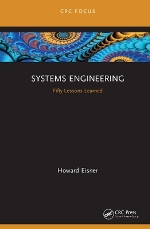BOOK REVIEW
 Book Title: Systems Engineering: Fifty Lessons Learned
Book Title: Systems Engineering: Fifty Lessons Learned
Author: Howard Eisner
Publisher: CRC Press; 1st edition
List Price: $26.95
Format: Softcover, 138 pages
Publication Date: January 2022
ISBN: 978-0367422424
Reviewer: Jaime Chavira Moreno, MBA, PMP, CSM
Review Date: June 2023
Introduction
Within this valuable compilation, Howard Eisner presents a wealth of lessons learned that offer practical wisdom applicable to diverse professional fields. The author takes a direct approach, diving into a wide spectrum of topics including general systems technicality, management and leadership, idea-based concepts, people-oriented aspects, and miscellaneous insights. This approach grants readers immediate access to a rich array of lessons and their real-world applications. Drawing from his own experiences and expertise, Eisner imparts invaluable knowledge that can enhance the day-to-day work life of professionals across various industries.
Overview of Book’s Structure
The book’s structure comprises six primary sections, each focusing on distinct chapters of lessons learned from Howard Eisner. The initial section covers the first nine lessons learned in the “technical” category of systems engineering. The subsequent section encompasses nine lessons in the “management” category. Following that, the book delves into ten lessons in the “idea-based” category, followed by twelve lessons in the “people-oriented” category. The final section presents ten lessons in the “miscellany” category. Together, these five categories encompass a comprehensive collection of fifty lessons learned. Additionally, the book concludes with the author’s top ten lessons learned.
Highlights
Please note that the following highlights contain spoilers. Within the book, the author shares fifty lessons learned from over fifty years of experience in the field of systems engineering. Notable highlights from the technical category include Lesson 5, which emphasizes the importance of conducting cost-effectiveness analysis before attempting integrations to avoid resource allocation issues, and Lesson 8, which underscores the significance of active participation in contract negotiation and ongoing monitoring of contract outcomes. In the management category, Lesson 11 squanders for under promising and overdelivering and advocates for understanding and striving to achieve project requirements. Lesson 25 in the idea-based category stresses the value of staying updated on emerging tools and utilizing them as needed. Within the people-oriented category, Lesson 31 explores effective leadership traits in the modern world, while Lesson 32 delves into establishing crucial relationships with superiors to positively impact one’s career. Lastly, in the miscellany category, Lesson 45 encourages thinking outside the box and embracing different perspectives.
More…
To read entire Book Review, click here
How to cite this work: Moreno, J. C. (2023). Systems Engineering: Fifty Lessons Learned, book review, PM World Journal, Vol. XII, Issue IX, September. Available online at https://pmworldlibrary.net/wp-content/uploads/2023/09/pmwj133-Sep2023-Moreno-Systems-Engineering-50-Lessons-Learned-book-review.pdf
About the Reviewer

Jaime Chavira Moreno, PMP
DFW Metroplex, Texas, USA
![]()
Jaime Moreno is an accomplished professional with a strong background in customer service, healthcare process improvement, Accounts Payable automation, and project/product management. With his exceptional organizational skills and results-driven mindset, he is dedicated to assisting businesses in their growth and success. Recently obtaining PMP certification in early 2023, Jaime brings a wealth of project management expertise to drive successful outcomes and ensure streamlined project execution. He can be contacted via e-mail at Jaime.Moreno@JVKStrategies.com or LinkedIn at https://www.linkedin.com/in/jaime-chavira-moreno/
Editor’s note: This book review was the result of a partnership between the PM World Journal and the PMI Dallas Chapter. Authors and publishers provide books to the PM World Journal; books are delivered to the PMI Dallas Chapter, where they are offered free to PMI members who agree to provide a review within 45 days; book reviews are published in the PM World Journal and PM World Library. After publication, reviewers can claim PDUs for PMP recertification, or continuing education units from other professional bodies.
If you have read a good recently published book related to managing programs, projects or teams of professionals, consider authoring a book review for publication in the PM World Journal. For our standard format or for more information, contact Editor@pmworldjournal.com or visit https://pmworldlibrary.net/book-review-program/
If you are an author or publisher of a project management-related book, and would like the book reviewed through this program, please contact editor@pmworldjournal.com.









